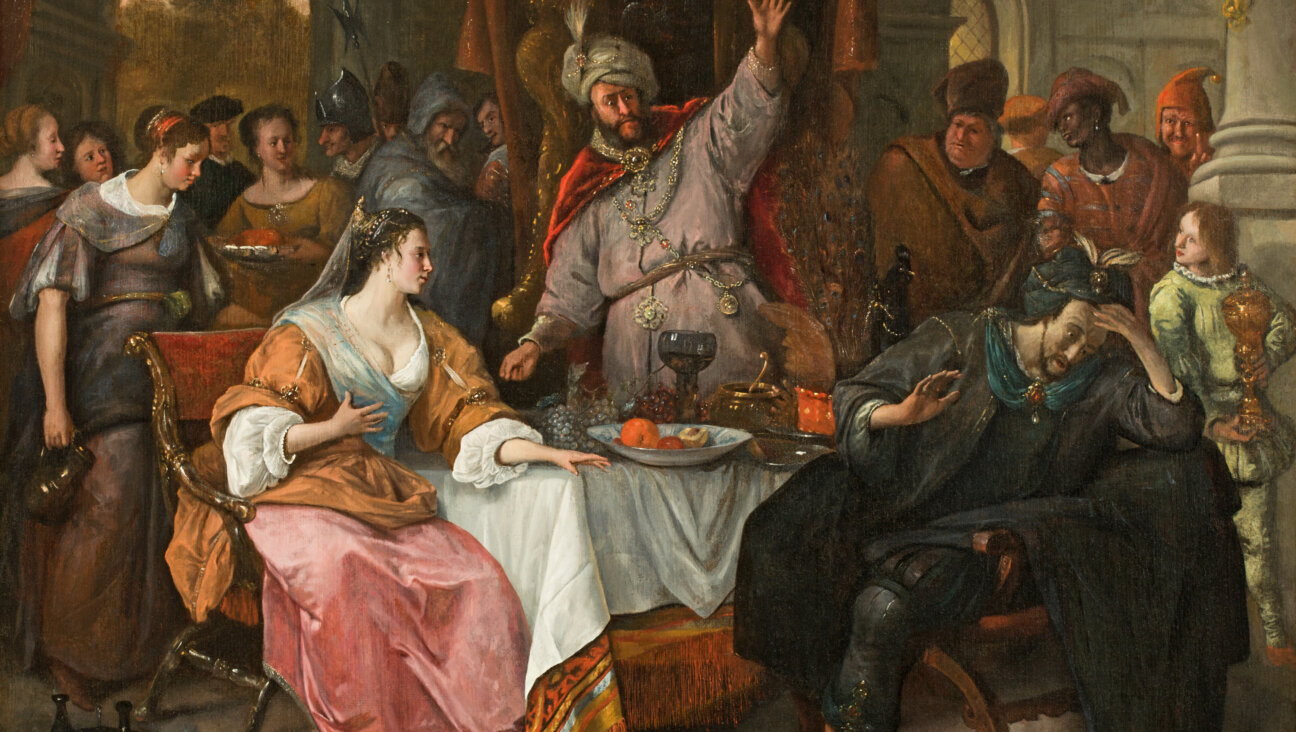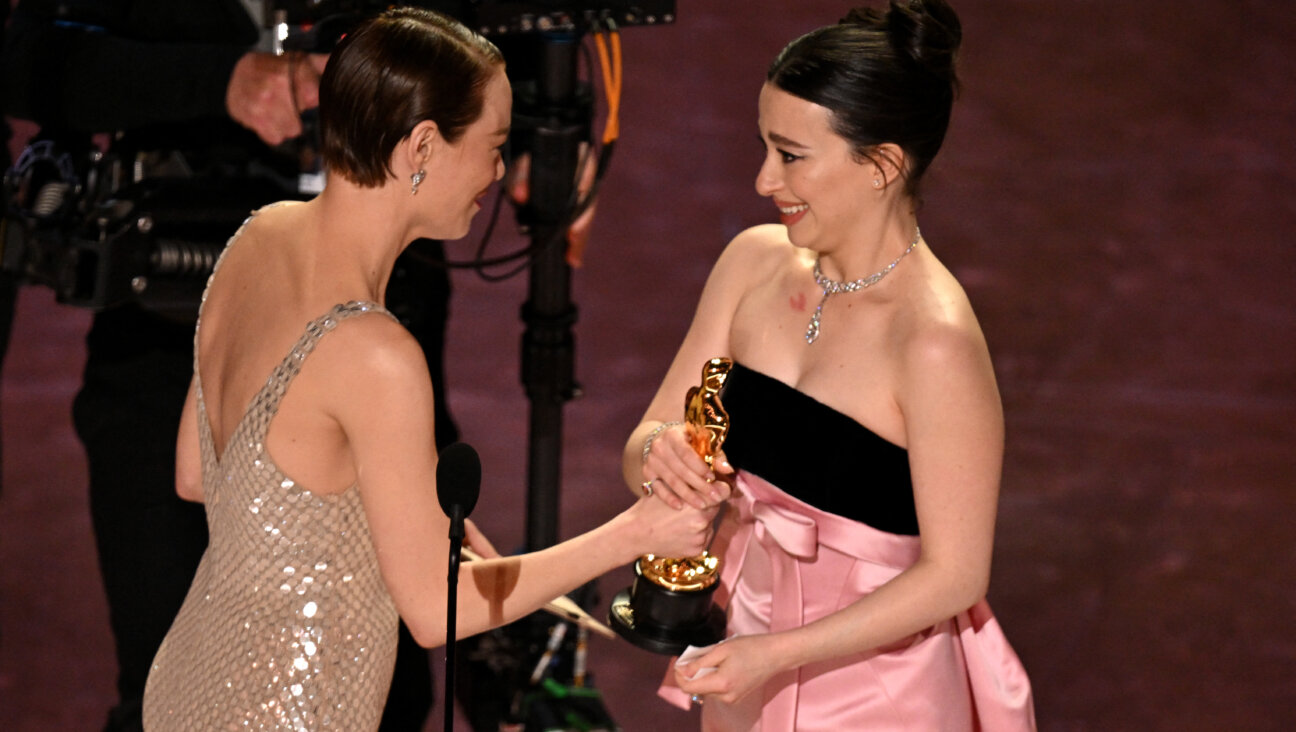‘Cabaret’ will wine, dine and destroy you
The immersive Broadway revival lulls you into comfort — to make your stomach turn
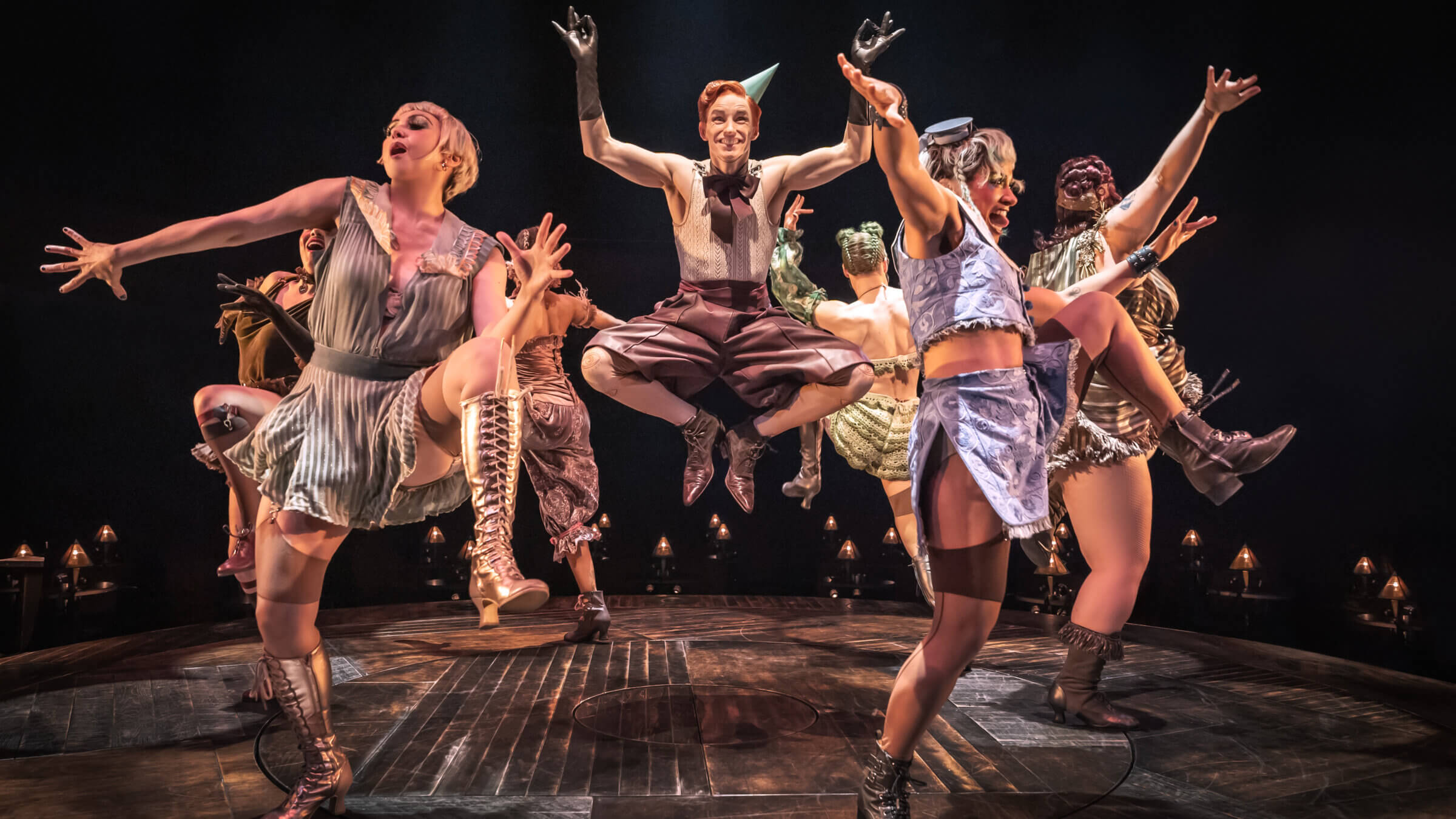
Eddie Redmayne as the Emcee with the Kit Kat Club company. Photo by Marc Brenner
It’s New Year’s Eve at Berlin’s Kit Kat Club, circa 1930. The air is saturated with sex of all sorts. Possibility beckons, but no one will make good on their resolutions. Not much will change — unless you count all of Germany.
The individual tragedies of stasis at the center of Cabaret, John Kander and Fred Ebb’s musical elegy to the Weimar Republic, are belied by its regularly rejiggered revivals. Based on John Van Druten’s play I Am a Camera — itself taken from a selection from Christopher Isherwood’s Berlin Stories — the songwriting team, working with a book by Joe Masteroff, expanded a slight tale about an expat chanteuse and her writer roommate into a trenchant warning against fascism.
But no two stagings are alike — even the Oscar-winning film departs significantly from the source material.
On its surface, the new production by Rebecca Frecknall, imported from the West End, has a major innovation: renovation. The August Wilson Theatre has transformed from a proscenium house to an in-the-round auditorium. Scenic and theater designer Tom Scutt (who also did costumes) has daubed even the stairwells with Weimar glory. Eye motifs — sconces, logos, a rotating disco ball pupil — greet the visitor along with complementary schnapps before one settles in an assigned seat, perhaps at a lamplit table with built-in telephone. If the original 1966 production held a literal mirror to its audience, reflecting back complicity, the goal of this run’s extended pre-show of performers in harem pants, doing a modern dance dumbshow throughout the building, is surely one of hospitality and comfort.
It’s more than a gimmick. The famous opening, “Willkommen,” invites us to leave our troubles outside — to numb ourselves to a grim reality that will slowly penetrate this decadent escapism. By the end of Act 1, Novocain turns to venom. The Jew, the queer, the untermensch is made to feel most unwelcome as quiet American Cliff Bradshaw learns the doctrine of Mein Kampf is, for some of his new acquaintances, praxis.
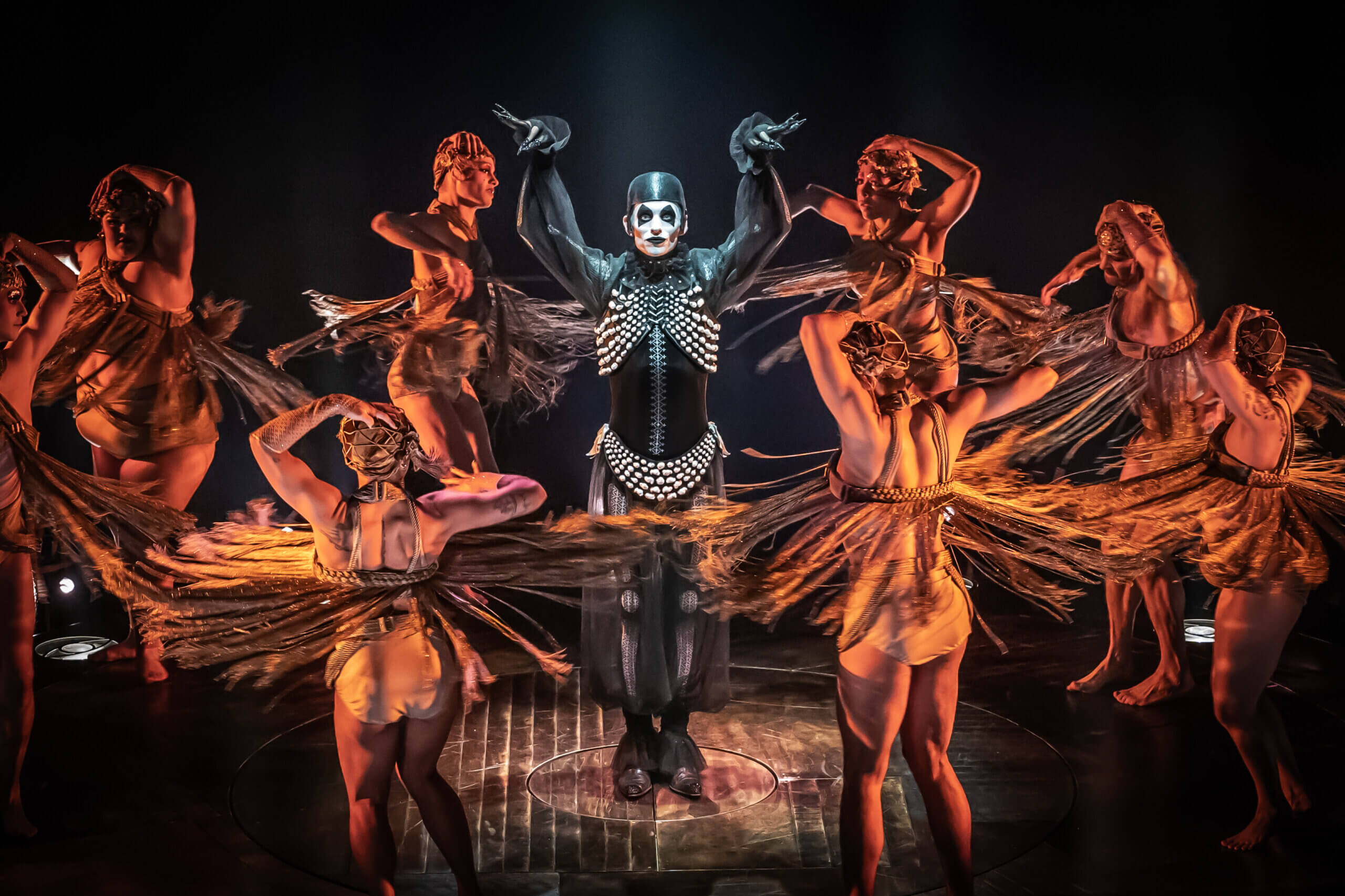
Setting the evening’s tone is, as always, the Emcee, here played with a warble by Tony and Oscar-winner Eddie Redmayne. In a way you can judge any version of Cabaret by its master of ceremonies. Joel Grey, who originated an impish, pancake-makeup rictus could not be more different than Alan Cumming’s gaunt, garter-wearing compere who, in Sam Mendes’ revival, was hinted to be a victim of the Holocaust, bidding patrons “auf wiedersehen” in a striped uniform at the play’s close.
As befits a production whose semi-dressed ensemble features nonbinary actors, flouncing and simulating sex to Julia Cheng’s kinetic choreography, Redmayne’s Emcee is the most fluid yet. He begins the show as a genial and scoliotic redhead in a girdle, morphs into a taloned embodiment of martial and economic ambition, does a spell as the clown Pierrot and ends the night as a ramrod-straight conductor of drab, Aryan conformity. He is not so much a character as he is a premonition.
But he is the exception amid a cast of the doomed. Cliff’s landlady, Fräulein Schneider (an excellent Bebe Neuwirth) is introduced singing “So What,” an ode to settling. She will, predictably, resist the happiness offered by her Jewish suitor, Herr Schultz (Yiddish Fiddler’s Steven Skybell, who sadly doesn’t deliver the oft-cut Yiddish tutorial tune “Meeskite”). Schultz, confident he’s as German as anyone, insists the Nazis are a passing phase. And the singer Sally Bowles, faced with a pregnancy and an offer to leave, refuses once more to change her life.
As Sally, Gayle Rankin, perhaps best known for Netflix’s GLOW, makes even her novelty numbers feel like one-act plays. Her “Maybe This Time,” in which she considers the stability of a decent man, is as vulnerable as her 11 o’clock title number is desperate, mad, defiant and resigned all at once.
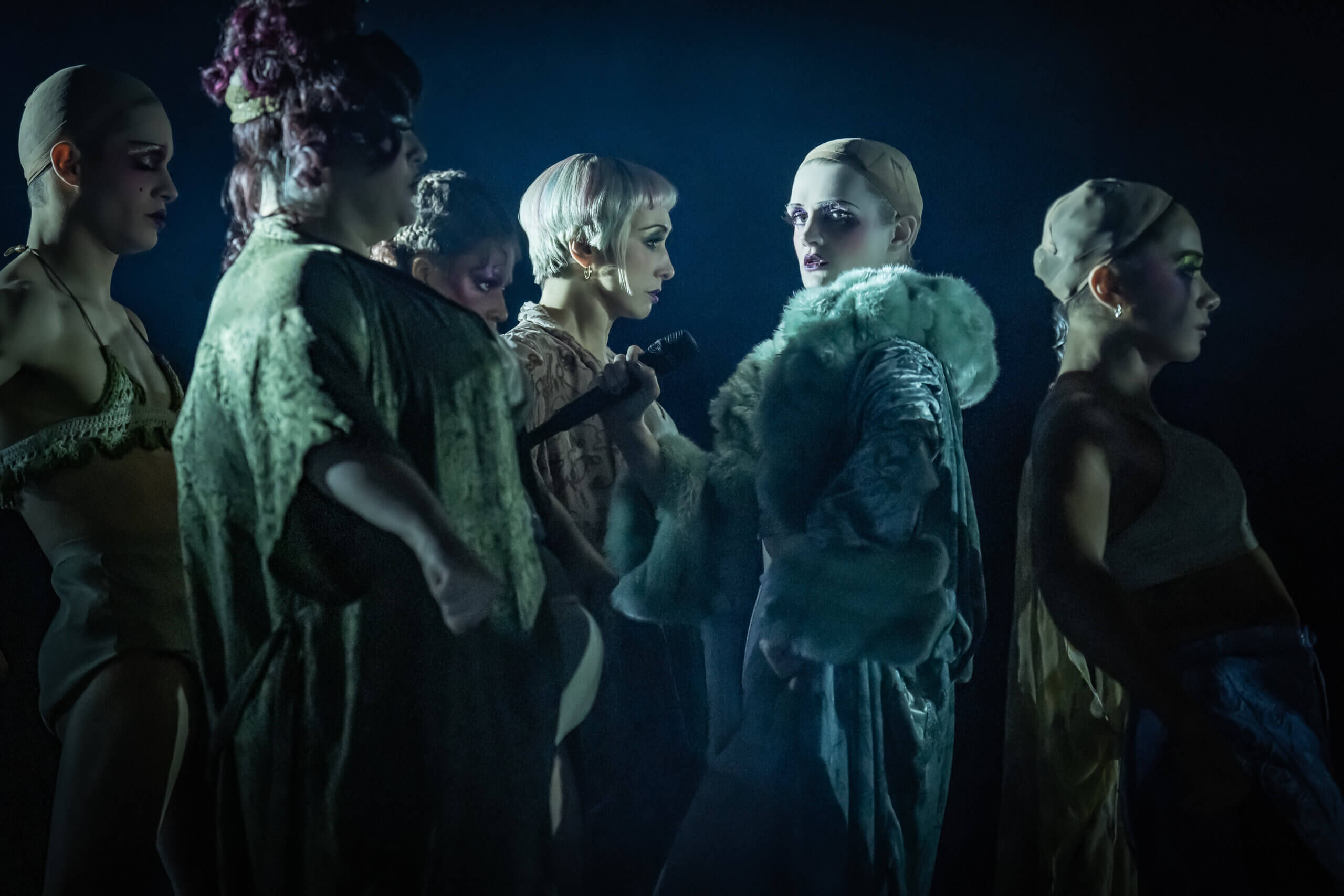
Without doing much to the book, and providing nearly nothing in the way of scenery, Fracknell’s Cabaret meets a moment where queerness is more visible yet ever more under threat and a former president is publicly questioning the loyalties of American Jews. Casting Ato Blankson-Wood, a Black man, as Cliff adds a new dimension, making more lucid his instinct to leave before the political winds shift. His fear of raising a family with Sally in Germany takes on a new subtext given his race — even if it makes his recruitment as a smuggler for the Nazis a touch more far-fetched.
The triumph of this iteration is how it anticipates its audience, teasing them with frothy liberation before making them gasp at Nazi armbands and shattered windows. As the Emcee oversees, or even appears at times to orchestrate, these national contradictions, it’s hard not to feel queasy at the dissonance. Particularly, I’d imagine, if you paid the upcharge for a stage-side meal.
When the drumroll closes the show, a new aesthetic takes hold, complete in its muted menace. Dramatic irony is the play’s engine; we know there’s no changing the outcome. But when we sit pretty at the Kit Kat Club — tipsy, titillated, terrified — it’s not too late for us.








